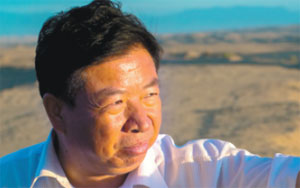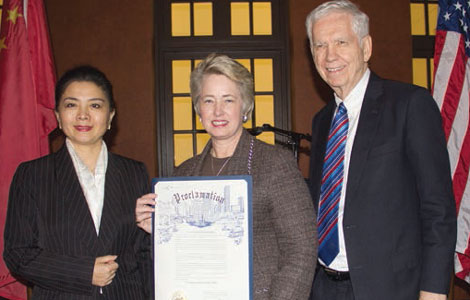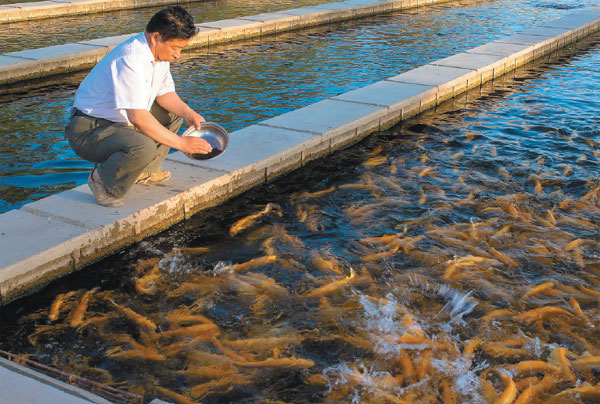Fishing in the desert
Updated: 2014-03-04 08:00
By Sun Yuanqing (China Daily USA)
|
||||||||
The Chinese Dream | He Yanzhong
He Yanzhong has been toiling in the desert in Dunhuang, Gansu province, for 13 years, determined to transform it into a fishery oasis. Sun Yuanqing follows his arduous journey and finds out what keeps him going.
He Yanzhong felt his legs weakening and his head spinning. Before he could make sense of what was going on, he collapsed to the ground. A total of 21 hours passed before he woke up from the coma and found himself in the hospital.
|
He Yanzhong makes a research trip to the desert near his fishery in Dunhuang, Gansu province. Photos Provided to China Daily |
|
He feeds the rainbow trout at his fishery in Dunhuang. |
This was only one of the four times He was almost killed while conducting field research in the difficult conditions of the desert in Dunhuang in Gansu province in Northwest China, where he is determined to transform one area into a fishery oasis.
"I cannot bear the disgrace of retreating from something I initiated," He says, recalling his 13-year combat in the desert.
Fishing in the desert may sound absurd, but He, who has been toiling with his colleagues for 13 years and invested 280 million yuan ($46 million), has proven that it is not only possible, but also beneficial to the ecological environment and local community at large.
"People thought I was crazy to put all this money into the desert instead of real estate and the banks. But here, the money can turn the environment into a liveable one for everyone. For me, this is the true value of money," says 52-year-old He, who is the founder and chairman of Bibo Company, which develops cold-water fisheries.
He was voted by tens of thousands of netizens as one of "the Grassroots Heroes of 2013" ahead of an award ceremony hosted by Xinhuanet.com in early January.
"This is more than an affirmation for my personal effort. It shows the public's increasing awareness of desertification in China," he says.
China is one of the countries most severely impacted by desertification. There are 2,620,000 square kilometers of land degraded by desertification in China, which makes up one-third of the national territory and causes more than 54 billion yuan ($ 9.59 billion) of economic loss a year, according to the State Forestry Administration.
In Gansu province, the situation is worse. Almost half of the land has gone through desertification. In Dunhuang, no matter how many trees the locals grow, they eventually die off because of extreme drought.
"You could dig as deep as 20 meters into the ground and still be unable to find any underground water," He says.
But years after He and his employees arrived in Dunhuang, spring streams have started running just 2 meters under the ground, as the waterways he built filter the floodwater and enrich the soil. More than 100 fishponds have been built and more than 800 tons of rainbow trout are harvested every year, not only to feed the local population, but also all over China.
When a once-in-a-century flood happened in 2011, completely damaging the fishery, Yangguan county downstream of the fishery remained intact thanks to the flood diverted by the fishery.
The fishing industry not only protects the locals' lives, it also brings comfort. One mu (0.07 hectare) of fishing pond produces about 10,000 kilograms of fish, which brings more than 60,000 yuan ($9,774) of profit, 600 times more than the profit from growing wheat. The fishery hardly consumes water while 1 mu of wheat uses up to 600 tons of water a year.
Born in rural Gansu, He was the first to develop a cold-water fish industry in Gansu. Cold-water fish, such as salmon, sardine and trout, are considered healthy eating and attract high prices at market. By 2000, He was already a billionaire and deemed as "the king of rainbow trout". In 2001, He was invited by the Dunhuang municipal government to invest in Dunhuang, a historical city threatened by the Kumtag desert.
"There was nothing but sand. No water, road, or electricity," He recalls his first days in Dunhuang.
But He was confident that once he drew the snow water from the neighboring Qilian Mountains and Altun Mountains to the desert, it would be a perfect area to develop fishing.
The reality proved harsher than He had thought. Sandstorms swept away forestry they had just planted and heavy summer rain and debris filled up fishponds that had just been excavated. The biggest disaster came in 2011 when tens of thousands of brood fish that took decades to breed and millions of marketable fish were washed away in the debris flow, causing losses of at least 160 million yuan to the company.
"I realized that a flood was more horrible than desert. We can never survive as a company if the ecology at large doesn't improve," He says.
His daughter He Yuting was with him throughout the 2011 catastrophe. "I never understood why my father had gone so far to develop fishing in a desert away from home, but after I witnessed how devastated he and his colleagues were after the flood, I came to emphathize with him," his daughter says.
He soon invited irrigation experts and ecologists to Dunhuang to investigate the routes of the flood. A total of 13 waterways, which run more than 90 kilometers in total, were built to divert the flood.
The waterways, built with locally sourced rocks and sand, produce clear water for fishing. More than 20 kilometers of trees and grape yards were built alongside the river, which pushed the desert more than 5 kilometers back.
He is not alone in realizing his dream of building an industry chain that starts in the fishery and goes on to benefit the local ecology and further boosts tourism.
The Chinese Academy of Sciences has established a research center in the fishing base to assist and promote the ecosystem He initiated. More than 400 people have come to work in the fishery, and more than 200 have decided to stay in the desert.
"The job is tough but we are seeing more hope everyday. He has been a role model for us with his persistence and down-to-earth attitude," says Sun Huili, who has been working with He for a decade.
Both He's son and daughter have come back to help him after graduating from universities.
"The job is far from done. There are still hundreds of hectares of desert to conquer. We hope the next generation will continue our effort," He says.
Contact the writer at sunyuanqing@chinadaily.com.cn.
Q&A

Q: What's your dream?
A: When I first came to Dunhuang, my dream was rather simple. I planned to set up a cold-water fish industry chain that benefits from the snow water from the nearby Qilian Mountains. But after my dream was stranded in the desert, I realized that without a good ecological environment, it's impossible for anyone to succeed. I began to take the larger picture into consideration. Now my dream is to build up an industry chain that starts in the fishery and goes on to benefit the local environment and eventually promotes local tourism.
What's your take on the Chinese Dream? How is it related to your dream?
People are always worried about food safety and pollution. In the rural area where I work, people also have problems related to overuse of the land and low income. Restoring the ecosystem has been put on the national agenda by the 18th National Congress of the Communist Party of China. This is also my dream. With what I am doing, I utilize snow water, which is probably one of the few water resources that has been untouched by pollution. By drawing the water to the desert, we breed the trout while enriching the soil. It also saves water and increases the farmers' incomes.
How have you built trust and cooperation with locals to achieve a common goal?
When we first came to Dunhuang, the locals didn't show much interest. But it didn't take long for them to figure out that fisheries are much more lucrative than growing wheat, and I try to involve as many local people as I can. There are more than 200 local people working in my fishing base or who have set up their own business.
What will China be like in 20 years?
Some 20 years ago, people had no idea what I was doing. But now, I don't even have to explain what rainbow trout are and how fisheries are more eco-friendly than crop farming. The social awareness of healthy food and environment has been increasing very fast. I expect that 20 years from now, the government will have set up stronger policies to support eco-friendly industries and we will have more professionals specializing in such matters.
(China Daily USA 03/04/2014 page8)

 Oscars 2014: Most catchy moments
Oscars 2014: Most catchy moments
 China joins in NY Times' travel show
China joins in NY Times' travel show
 UN envoy condemns terrorism
UN envoy condemns terrorism
 Rio drops protests for Carnival
Rio drops protests for Carnival
 Houston-China bonds deepen with new group
Houston-China bonds deepen with new group
 Citizens mourn victims of Kunming terror attack
Citizens mourn victims of Kunming terror attack
 Putin justifies potential military move in Ukraine
Putin justifies potential military move in Ukraine
 Photos: Kunming rail station violence
Photos: Kunming rail station violence
Most Viewed
Editor's Picks

|

|

|

|

|

|
Today's Top News
US halts military engagements with Russia
First Lady to visit China in March
Terrorists in Kunming attack busted
Gravity, Slave Oscar winners
2014 the year of the Chinese IPO?
China making progress on fighting pollution: experts
Michigan benefits from ties with Chinese
Detroit toasts all time high in China trade
US Weekly

|

|








